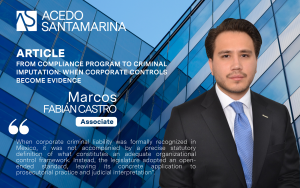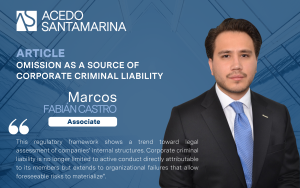
In an appeal for review filed in defense of the interests of a minority of shareholders of a certain corporation, Acedo Santamarina succeeded in having the First Chamber of the Supreme Court of Justice of Mexico interpret Article 163 of the General Law of Mercantile Corporations in accordance with the Mexican Corporate Law.
As part of a commercial lawsuit filed by a group of shareholders of a corporation in which the civil liability of the sole administrator of such corporation was sued, Acedo Santamarina filed an appeal for review that was resolved by the First Chamber of the Supreme Court of Justice of the Nation, in the sense of establishing that it is not an indispensable requirement for the exercise of the action provided in Article 163 of the General Law of Commercial Companies, the holding of a shareholders’ meeting in which the liability of the administrative body was deliberated.
During the past year, shareholders owning more than 25% of the capital stock of a certain corporation filed a direct constitutional appeal (juicio de amparo directo) against the decision of a unitary circuit court to declare inadmissible the civil liability action brought by such shareholders based on Article 163 of the General Law of Commercial Companies (Ley General de Sociedades Mercantiles). In their amparo action, the shareholders argued that the judgment of the unitary court violated their fundamental rights of legal certainty and access to effective judicial protection, by denying them standing to sue for the payment of compensation to compensate the company for the damages caused by improper administration. However, the collegiate court denied the federal protection requested under the argument that it was necessary to prove the holding of a shareholders’ meeting in which the liability of the administrative body had been discussed as a prerequisite to exercise the corporate action.
Dissatisfied with the ruling of the collegiate court, the minority shareholders filed an appeal for review in which they argued that the court failed to interpret Article 163 of the General Law of Commercial Companies in accordance with the fundamental right to effective judicial protection and the principle of progressiveness in the interpretation of this human right, thus unreasonably and disproportionately hindering the exercise of the rights provided by the General Law of Commercial Companies in favor of the minority of shareholders to which they belong.
In ruling on the appeal for review, the First Chamber of the Supreme Court of Justice of the Nation established that the rules of commercial law, as well as civil law, must be interpreted by the judicial bodies in accordance with the fundamental rights provided in the Constitution and in international treaties, without this being considered a violation of the procedural fairness of the parties.
Based on the foregoing, the First Chamber made a systematic, literal, authentic and teleological interpretation of Article 163 of the General Law of Commercial Companies, after which it concluded that the shareholders’ right to effective judicial protection had been violated, It stated that in order to exercise the civil liability action against the administrative body of a corporation, it is not possible to demand from the qualified minority the requirement of having previously held a shareholders’ meeting, since such requirement does not provide legal certainty and renders the possibility of exercising the corporate action burdensome and even null and void.
In accordance with a conforming interpretation of Article 163 of the General Law of Commercial Companies, the First Chamber stated that the only requirements that the legislator contemplated to exercise the action in favor of minority shareholders are: i) that those exercising it represent at least 25% of the share capital; ii) the action must be brought in favor of the corporation and not in favor of the particular interests of the shareholders; and iii) that the shareholders comprising this minority may not have exonerated the director at a general meeting and that, in the event that a meeting has been held at which the non-liability of the director has been deliberated and agreed upon, the opposition of the minority shareholders to such determination must be recorded in the minutes.
The First Chamber considered that, in order to exercise the corporate action, it is not necessary in all cases to have previously held a shareholders’ meeting, since such requirement represents an undue obstacle to the access to effective judicial protection of the minority of shareholders.
Based on this analysis, by unanimous vote, the First Chamber reversed the challenged judgment and granted the protection to the complaining shareholders.
The resolution of the Supreme Court grants certainty to the qualified minority of a corporation that intends to demand from the administrative body the liability inherent to its mandate, by clarifying which are the requirements that must be met to exercise the corporate action, based on an interpretation of article 163 of the General Law of Commercial Companies that is in accordance with the fundamental right to effective judicial protection provided in our Political Constitution.





